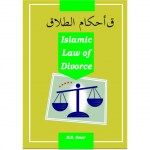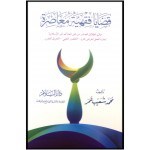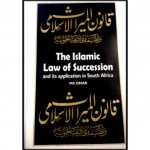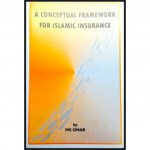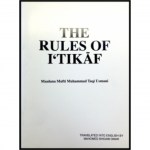More About Us
MS Omar & Associates is a niche market law firm based in Durban which was established in July 1983 and specializes in all aspects of Corporate and Commercial law, Family Law, Trusts Law, Estate Planning, Litigation, Dispute Resolution, Labour Law, Conveyancing and Shariah law including Islamic Finance.
 SUPPORT
SUPPORT
Don’t hesitate to contact M.S Omar & Associates regarding any questions you have or for further information. You can reach us online, or by calling (031) 306 3282
Question on Zakah Implications of Compulsory Pension and Provident Funds
Dear Respected Brother, Shaykh MS Omar
It would be appreciated if you could assess the Zakah implications on my Deferred Pension because I’m receiving contradictory advice. Basically, the structure is as follows:
When I joined Newco in 10/1987 it was a condition of employment to contribute to the Newco Group Pension Fund (NGPF), a non-Shariah compliant retirement fund.
At around 1996 most pension fund members were transferred into a provident fund, still called the NGPF.
During 1997 my work function was made redundant, and I was compulsorily retrenched from Newco in 12/1997. This was solely the company’s decision, and I had no discretion in the matter. Upon being retrenched, I opted for a deferred pension. This meant that my pension benefits remained in the NGPF until it was to be either withdrawn (with a higher tax impact before age 55) or when I became eligible for retirement (with a lesser tax impact at age 55+). The rules of the NGPF state that the normal retirement age is 63, and that early retirement is possible from age 53. To date, I had decided not to withdraw or retire from the NGPF, as I probably will continue working for another 4 years or so until age 63 at my current Employer, insha’Allah. I’m also a member of its non-Shariah compliant pension fund, which was also a condition of employment.
The guidance I received from an Islamic socio-welfare NGO was that because:
I had no choice in being a member of the NGPF; and I had specifically decided not to retire from the NGPF yet, and hence do not have access to the funds, it is not zakatable. The contrary guidance I received from an Investment Manager, is that because it was possible to retire from the NGPF since age 53, it is zakatable.
It would be appreciated if you were able to provide guidance on the above matter, including the principles upon which your valued opinion is based (~ ratio decidendi). Please also indicate if there is consensus amongst scholars of the various Mathaaib on matters such as, or similar to the above set of circumstances.
JzkAllah again for your time. Please let me know if you require any further clarification or additional details.
RAC
Answer
1. It is apparent that you were employed by Newco from October 1987 to December 1997, when your employment was terminated by way of retrenchment.( “ the Employment Period”)
2. During this employment period, you were obliged to contribute each month , as a deduction at source, to the Group Pension Fund ( NGPF) , as a mandatory term of employment.
3. No Zakah is payable by you, as a member of NGPF, during the approximately 10 year Employment Period, because the monthly at- source deductions from your salary did not enter into your ownership but in fact were transferred to, and deemed to be owned by NGPF as a separate legal person or entity .لعدم الملك التام المملوك رقبة و يدا : راجع رد المحتار: كتاب الزكاة
4. In December 1997 , you became entitled to withdraw the lump sum proceeds of your pension fund benefits , ( “ lump sum amount “) following your termination of employment by way of retrenchment in October 1997.
5. At this point, ( December 1997), upon maturity, you became for the first time, the owner of the lump sum amount, acquired actual or constructive possession and control thereof, and were entitled to dispose or deal with the lump sum withdrawal benefits, as you pleased.
6. It follows that Zakah became payable on the withdrawal benefits constituting the lump sum amount, in the year of actual receipt thereof, ( December 1997) , and not for prior preceding years, during the Employment Period.
7. The fact that you voluntarily elected to transfer the lump sum amount to another retirement arrangement in the form of a Deferred Pension does not affect the Zakah position: you remain liable for Zakah , upon actual or constructive possession, and thereafter upon the passing of each lunar year , calculated as from the year of receipt of the lump sum amount. ( December 1997).
8. It should be mentioned that the lump sum amount in the form of the withdrawal benefit as at the 31 December 1997 is characterized in Shari’ah as compensation for services rendered in the past , and accordingly deemed halaal, irrespective of the source of accrual. The amount representing the growth , over and above the aggregate contributions, does not constitute riba or impermissible income, because it is not a return on the ownership of the employee. Purification is therefore not required in respect of the withdrawal benefit upon maturity.
9. Now we turn to your employment situation after 1997, whereafter you joined a new employer, and currently remain employed: you are currently (post-December 1997) a member of a new separate pension fund ( “ the New Pension Fund”) in terms of a mandatory condition of employment, in terms of which your contributions are deducted at source and transferred by your new employer to the New Pension Fund. ( not connected to the previous voluntary deferred pension arrangement).
10. The same principles apply as set out in paragraph 3 above mutatis mutandis in the sense that your monthly contributions, deducted at source, are owned by the New Pension Fund, with the result that no Zakah is payable until the lump sum proceeds become due and payable to you, as a withdrawal benefit, in the year of actual receipt, upon termination of your current employment ( for whatever reason, including dismissal, resignation, retrenchment or retirement).
11. Once the member elects to transfer the lump sum withdrawal benefit, upon maturity, to another approved Fund ( eg Preservation Fund) , then the withdrawal benefit upon maturity is deemed to be in his or her Shari possession for all purposes, including the payment of Zakah. However, in this instance, the member will be responsible to invest the lump sum proceeds so received in Shari'ah-compliant investments.
12. The aforegoing answer accords with the conclusions of the illustrious Mufti of Pakistan, Mufti Shafei (ra) ( on The Zakaatability Of Provident Fund and Interest) and his distinguished son, Mufti Taqi Usmani, and the relevant resolution 143 ( 9-14 April 2005) of the International Islamic Fiqh Academy (an organ of OIC).
And Allah Knows Best
M S Omar
28 May 2022
Shariah Compliant Guidelines for Investing in the Stock Exchange in accordance with AAOIFI Shariah Standard 21
1. It is permissible to buy the issued shares in a listed company, whose core trading activity is Halal, but subject to the 5 percent rule relating to the purification of the impermissible income associated with a share, as set forth in paragraph 4 below.
2. However, despite the core activity of the company being Halal, the company may be engaged, as an incidental activity, in placing its surplus funds, generated from it’s permissible core activities, in a call account or money market instrument, or otherwise the company may also be engaged incidentally in an impermissible activity ( such as , sale of alcohol), and thereby earn impermissible income.
3. Does such impermissible income render the investment and /or trading in the shares of the company concerned Haram?
4. The contemporary Shariah experts, on the grounds of genuine need, have permitted investing in such a company ( whose core activity is Halal) provided that the aggregate total impermissible income of a company derived from impermissible incidental activities, or impermissible assets, as disclosed in the relevant financials, or, where necessary reasonably estimated, must not exceed 5 percent of the total permissible revenue generated by that company, during the accounting period under review.
5. The share itself must be purified of the impermissible income, on the basis that the proportionate share of the impermissible income , must be mandatorily removed and disposed off to charity, irrespective of whether the company concerned has shown a profit or a loss during the accounting period under purification. For example, the impermissible income for the relevant accounting period is R 100 000,00 and there are 100 issued shares in the company. Each share must accordingly be purified to the extent of R 1000. If the investor or fund owns 10 shares in the company, then the sum of R 10 000 must be purified and compulsorily transferred to charity .على سبيل التخلص منه
6. In this regard, the total investment in incidental impermissible activities, such as investment in interest-bearing securities and/or sale of alcohol, or another impermissible thing, should not exceed 30 percent of market capitalization, or, the total asset value of the company concerned.
6. The ownership of a share in the issued share capital of a company represents ( in substance) a proportionate undivided share in the underlying assets of the relevant company. يمثل السهم حصة شائعة في موجودات الشركة :
و شهادة السهم عبارة عن وثيقة للحق فى تلك الحصة: قرار مجمع الفقه الاسلامي الدولي
7. It follows that, if the core activity of the company is Haram( eg : manufacturing and distributing alcoholic beverages), then it is equally prohibited to buy and sell shares in such a company.( because the shareholder will be deemed to be owning and trading in such impermissible assets, not recognized as property in the Shariah). If a person wrongfully owns such shares, then he or she must sell them to a non - Muslim at a price proportionate to the Halal assets of the company concerned, such as buildings , vehicles etc, which are not directly connected to an impermissible activity. غير المتمحضة للعمليات المحرمة (see Mufti Taqi Usmani, Fiqhul - Buyoo , volume 2, page 1057 - 1058).
لان محل العقد عند تداول الأسهم هو
هذه الحصة الشائعة.
8. In the case of a Shariah-compliant unit trust fund ( registered under the Collective Investment Schemes Control Act, 2002 ), the impermissible income, not exceeding 5 % of total permissible revenue is properly deducted at source and mandatorily disposed off to charity.
9. It is not permissible to buy preference shares ( which entitles the holder to priority in profits), and interest bearing debentures.
لا يجوز إصدار اسهم ممتازة لها خصائص مالية تودي إلى إعطاءها الأولوية عند التصفية أو عند توزيع الأرباح .
10. The shares of a company whose assets consist solely and exclusively of cash and receivables must be bought and sold at face value. In this context, the transaction constitutes an exchange of money for money, which must be equal on both sides. Any sale at a premium or discount, falls within the definition of riba. However, investment in a company ( whose core activity is Halal) is permissible , if the tangible illiquid assets are not less than 30 % of the total market value of the assets , in which event the value of cash, receivables and cash equivalents are deemed to be subordinate
لكونها حينئذ تابعةلان اسهم تلك الشركة لا تمثل الا نقودا، فلا يجوز بيعها باقل أو اكثر من قيمتها الاسمية.
11. All conventional forward and future transactions within a stock exchange is prohibited for several reasons, including the fact that there is no real transfer of the Shariah risk, through actual delivery; in many cases, the transaction constitutes a settlement based upon a difference in prices only. Similarly, conventional derivatives, options , swaps, and short sales are impermissible.
لانه من أنواع المجازفات والمقامرة التي لا يراد فيها حقيقة البيع ، و تنتهى غالبا إما بالمقاصة بين اطرافها و إما بتسوية فروق الأسعار ، و هي نادرا ما تنتهي بالتسليم و التسلم فعلا.
12. Although borrowing on interest is prohibited, the proceeds of the loan are nevertheless lawfully owned by the borrowing company, with the result that goods or assets purchased in exchange thereof are Halal. The total amount so borrowed should not exceed 30 percent of market capitalization or total asset value of the company concerned at the relevant time.
اما عملية الاقتراض الربوي فحرام بلا شك، و يأثم بها فاعلها ، و لكن المبالغ المقترضة تدخل فى ملك الشركة و ضمانها، فلا يحرم ما يكسبه بها.
13. The above mentioned guidelines are consistent with the provisions of Shariah Standard 21 formulated by the panel of Shariah experts of AAOIFI, headed by Allamah Mufti Taqi Usmani.حفظه الله
M S Omar
Revised: 24 November 2022
قال شيخ الاسلام ابن تيمية رحمه الله : من اختلط بماله الحلال الحرام اخرج قدر الحرام و الباقى حلال له: مجموع الفتاوى: ج٢٩: ص ٢٧٣
More Articles ...
- Sale of an Apartment, OFF Plan , Prior to Possession
- Most Beneficial Prophetic Supplication
- Do the grandchildren( predeceased son’s children ) automatically inherit in the presence of the surviving son or sons of their deceased grandfather?
- Treasure Prophetic Dua
- Zakah Treatment of Shares in Listed & Unlisted Companies


